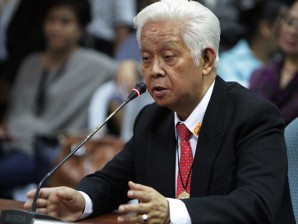Comelec may do over raffle for party-lists

Comelec Chairman Sixto Brillantes Jr. had said that the election body would be conducting the raffle before each election to avoid “abnormal names” of party-list groups with too many “A” and “1.” INQUIRER FILE PHOTO
Party-list groups that landed prime slots in the ballot for the May 13 elections may yet end up at the tail-end of the list with the Commission on Elections (Comelec) mulling over the possibility of redoing the raffle after it inadvertently included 13 groups that were not supposed to participate in the coming polls.
In an interview over the weekend, Election Commissioner Rene Sarmiento said the Comelec en banc will hold a special meeting today to resolve the issue.
Sarmiento said that among the options to consider were to simply adjust the listing, with some groups moving up in the ballot order once the names of the 13 groups had been removed from the list, or start over with the raffle.
“We will be meeting in the morning to discuss all possibilities, and we will be deciding on how to resolve this problem,” said the election official who heads the raffle committee.
On Friday, the Comelec held a raffle to determine how the more than 120 party-list groups would appear on the ballot—a first in the country’s 15-year-old party-list system.
Article continues after this advertisementIn the previous elections, the groups were arranged in alphabetical order, a system that spawned many organizations with names that began with “A” and “1,” hoping that they would get first mention on the ballot.
Article continues after this advertisementAbnormal names
Comelec Chairman Sixto Brillantes Jr. had said that the election body would be conducting the raffle before each election to avoid “abnormal names” of party-list groups with too many “A” and “1.”
Shortly after the raffle, the en banc found that 13 groups were mistakenly included contrary to a Comelec resolution which states that disqualified new applicants would only be included in the raffle if they obtained a mandatory injunction from the Supreme Court.
Brillantes earlier explained that disqualified new applicants that were able to secure a status quo ante order from the high tribunal would remain as they were—as applicants not yet accredited for the balloting.
A mandatory injunction will stop the Comelec from disqualifying them from the coming elections.
“Our resolution says that those new applicants, even if they were able to get a status quo ante order but they do not get a mandatory injunction, will not be included in the raffle,” said Sarmiento.
“The problem is, in reading the resolution of the Supreme Court, they were not able to distinguish which are new applicants and which are existing, that’s why they were mistakenly included in the raffle,” he explained.
Immediately resolve petitions
Sarmiento also urged the Supreme Court to immediately resolve the petitions of all the groups seeking relief after the Comelec en banc decided to drop them from the coming elections for their failure to comply with the law governing the party-list system.
He said the election body was hoping that these petitions would be resolved before the start of the printing of the ballots and the configuration of the precinct count optical scan machines next week.
Officially, only 84 party-list groups have been allowed by the Comelec to participate in the May 13 elections.
But 52 of the 194 groups the commission disqualified were able to secure a status quo ante order from the Supreme Court, including organizations whose nominees are multimillionaires and do not belong to the marginalized or underrepresented sectors of society.